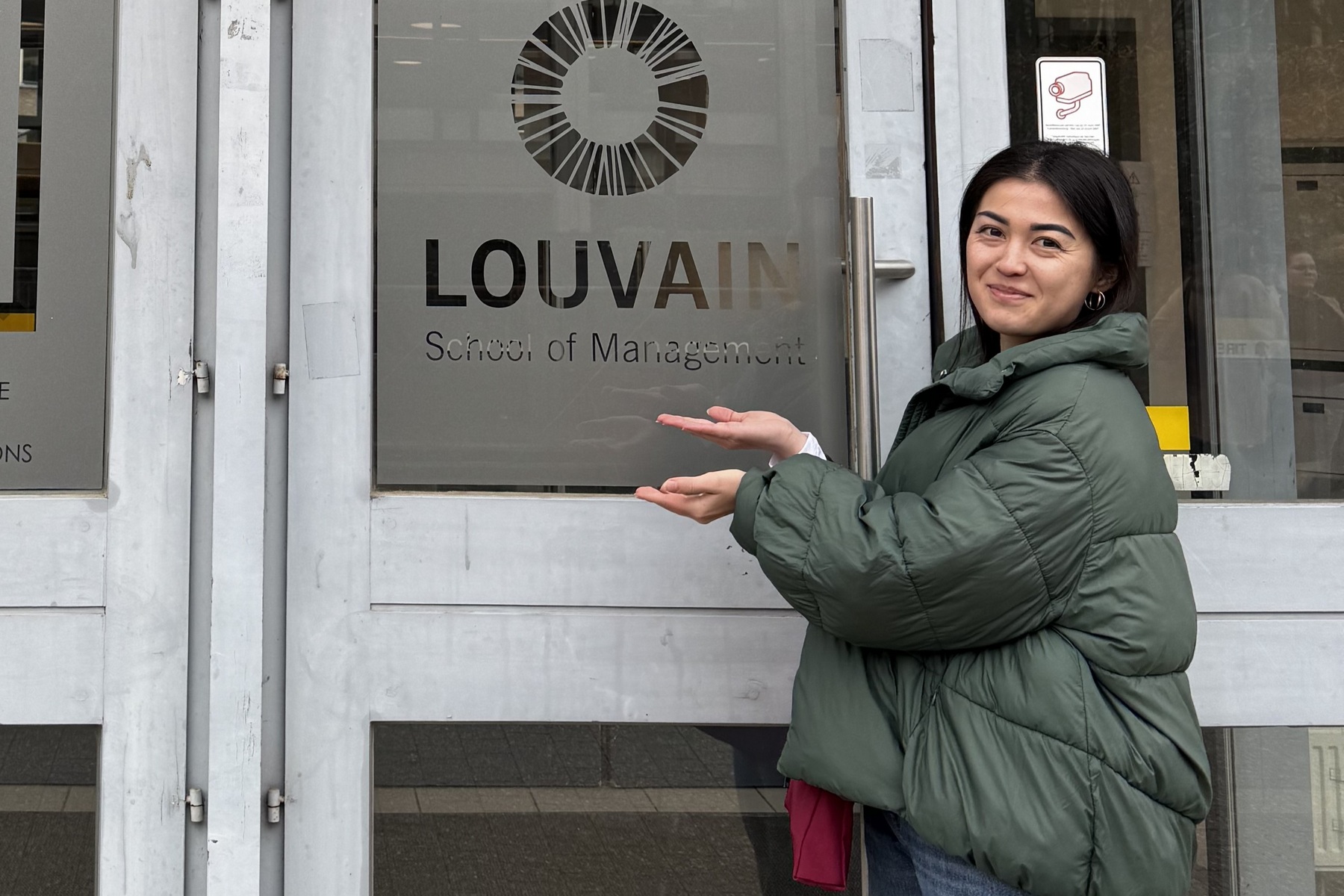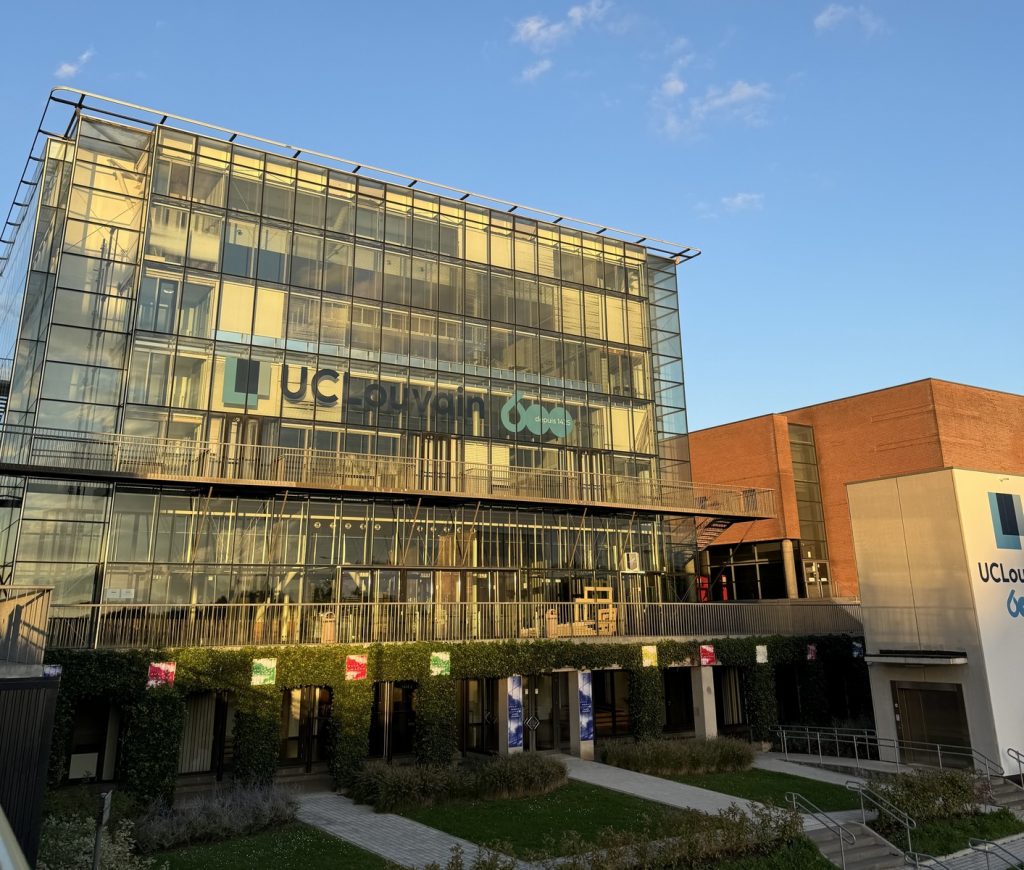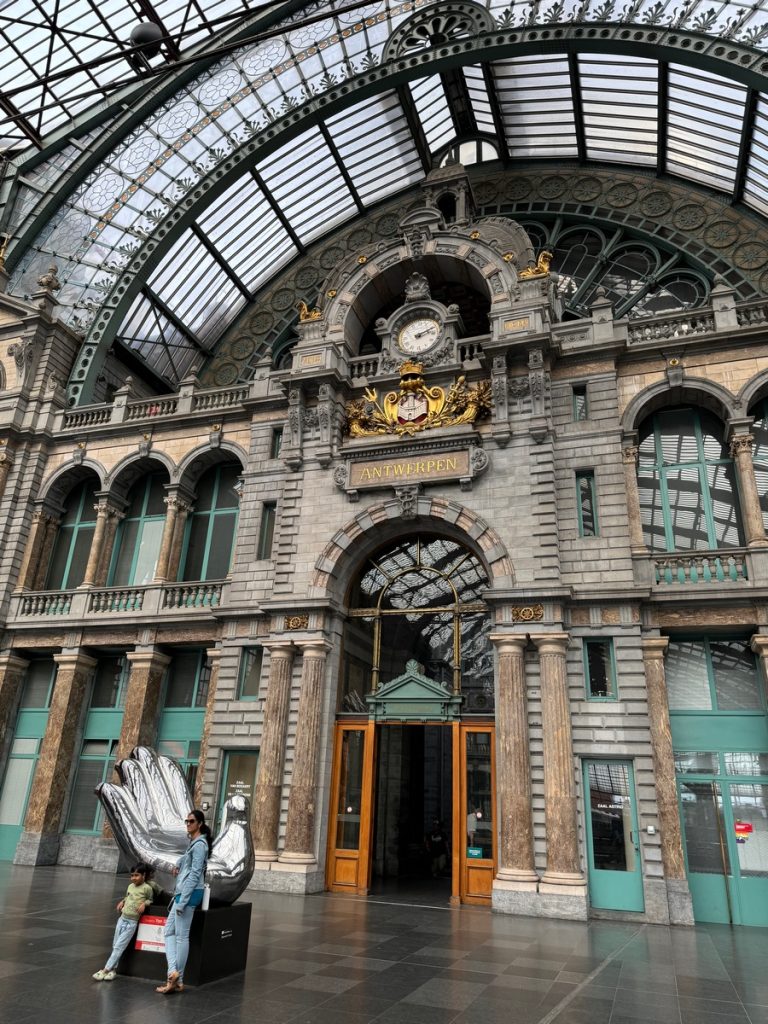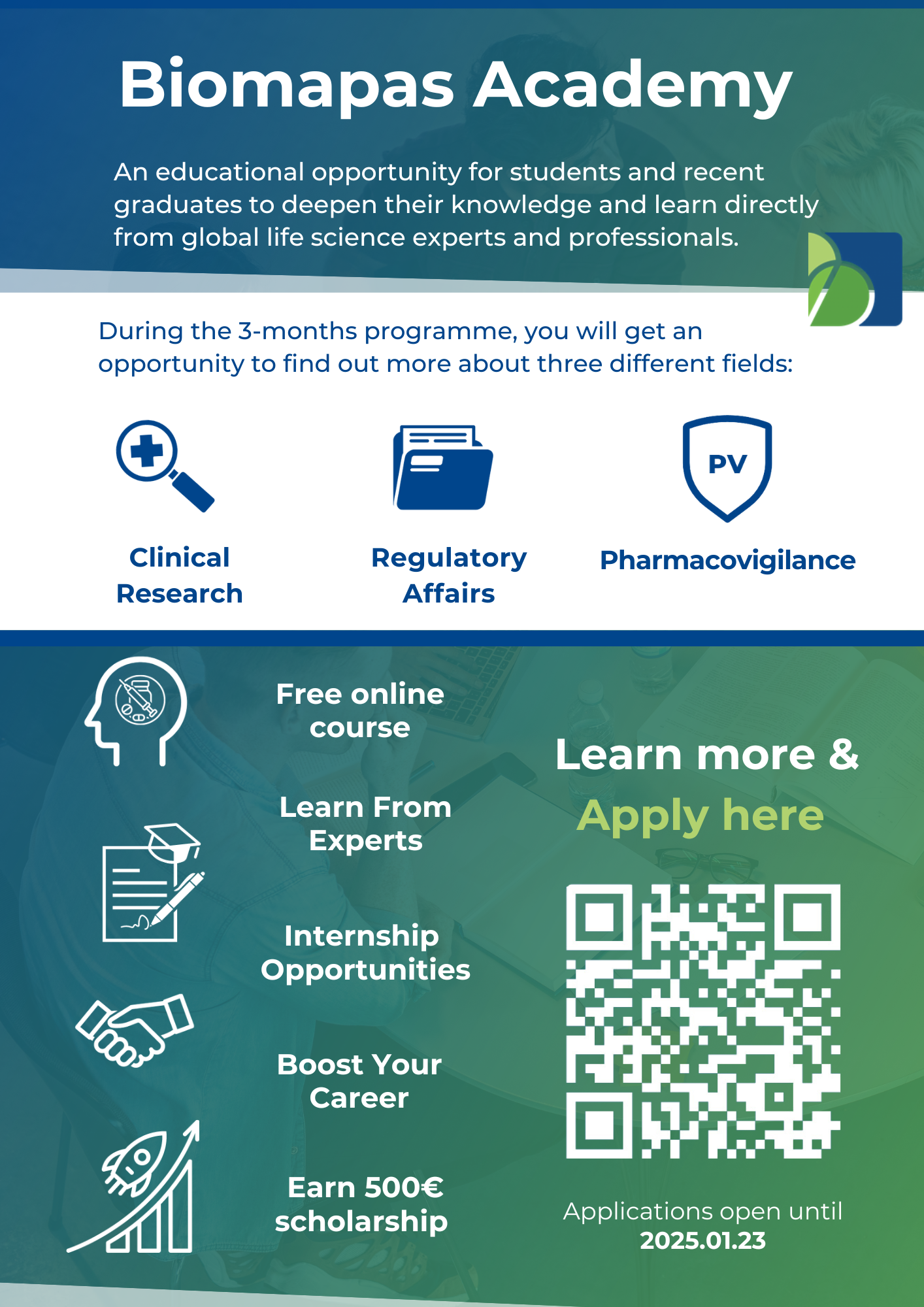VMU Student’s Year in Belgium. Practice-Oriented Studies and Career Opportunities in Europe
“I’m very happy that I went to study abroad: it will definitely be useful for my future career. During lectures, we solved cases of real companies, and we visited companies where we could potentially work in the future. I’ve also visited job fairs and met with representatives from the Big Four – the largest global accounting companies”, says Nigara Karimzhanova, Vytautas Magnus University (VMU) student of the Marketing and International Commerce program who spent two semesters studying at the Louvain School of Management of the University of Louvain, Belgium as a participant of Erasmus exchange.
Nigara came to study at VMU from Kazakhstan. In her native country, she completed bachelor’s degree studies of finance and accounting at the University of International Business. In Lithuania, she was interested in the opportunity to diversify her studies, so she chose a master’s degree program of a different area (marketing and international commerce).
“Before coming to Lithuania, I already had certain expectations, because I had heard feedback from other students. Still, when I came here for the first time, I was very impressed by how different everything was here. I really liked not just the quality of studies at VMU, but also Lithuanian architecture and the people”, notes Nigara.
Comparing her study experiences in three countries and three universities, the student says that in Kazakhstan her studies were more theory-based, whereas at VMU Faculty of Economics and Management, her master’s studies impressed her thanks to more practical focus and the possibilities to look for actual business solutions, to get in touch with the real world and prepare for a career. Practical application was also the focus of her studies in Belgium: e.g., one of the courses was dedicated solely to learning how to use an e-commerce platform.
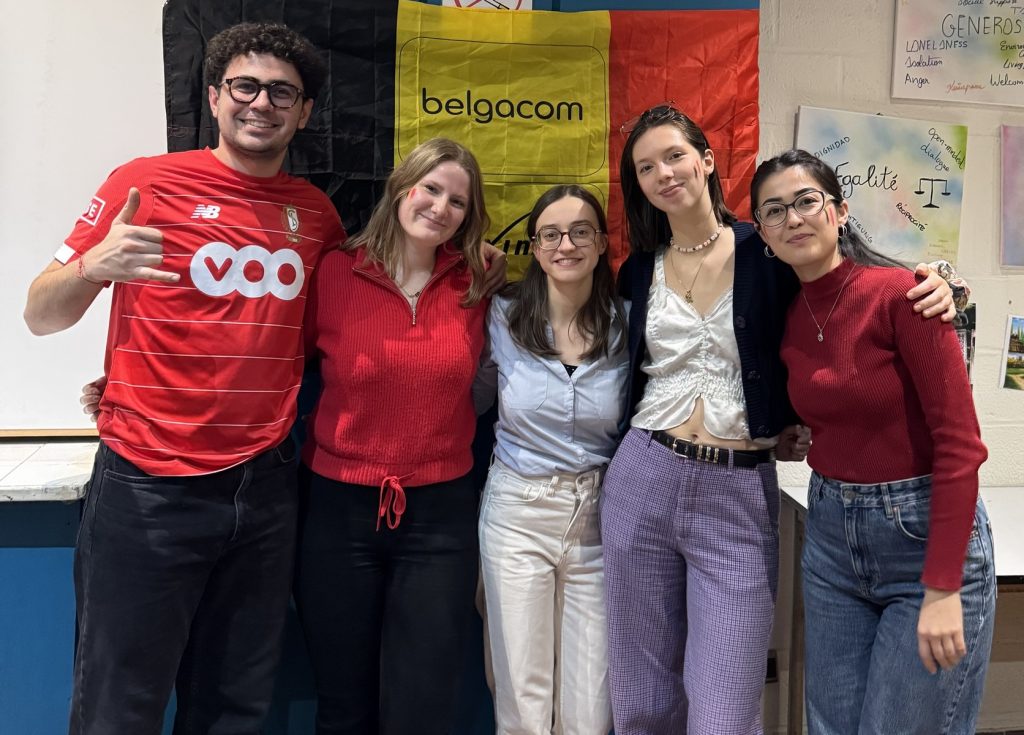
Nigara Karimzhanova (first from the right) with other students in Belgium. Photo from Nigara Karimzhanova’s personal archive.
Possible workplaces include the Big Four companies
“I really liked the study system at the University of Louvain, because it’s very different from many other places. Here, every semester is divided into two parts, so you can separate your courses. For instance, if you have six courses in one semester, you can complete three of them during the first part of the semester, and the remaining three during the second part”, Nigara explains.
According to the student, in Belgium, she participated in two career fairs that were organised at the university and explored the opportunities offered by various Belgian and European companies, including the so-called Big Four: Deloitte, EY, KPMG, and PwC. They are the largest audit and accounting companies in the world by revenue. Along with other students, Nigara also visited the KPMG Luxembourg Office.
Nigara is delighted that during studies she managed to receive useful advice on job search and preparation of a resume. She is certain that spending one half of MA degree studies in Lithuania and the other half in Belgium will be very useful to her career in the future. The emphasis on practical aspects during lectures will allow her to apply the acquired knowledge at work.
“I’d like to start a career, or at least start with internship. Maybe after studies I will manage to get employed at one of the Big Four companies, especially KPMG, because I visited their office and I really liked the atmosphere, the culture of the company. I’ll try my best to join it”, Nigara Karimzhanova explains.
University of Louvain. Photo from Nigara Karimzhanova’s personal archive.
Charmed by hospitality and beautiful cities
Sharing her impressions about the Belgian people’s hospitality and culture, the student was generous with compliments. “I felt warmly welcomed, they are very nice and kind. Our student house is very international, we have various activities thanks to which I learned many things about Belgium’s history, culture, and traditions. I even started learning French here and I really liked it”, she says.
“Like we all know, Belgium is very well-known for its waffles, chocolate, and fries, but they have other interesting food which is less known, as I’ve learned. While living with the local students, I’ve not only tasted but also joined in cooking it, for example, we all cooked a special Belgian chicken soup, which is called Waterzooi”, Nigara points out.
While studying in Belgium, she visited various cities of this country: Ghent, Bruges, Brussels and others. The student notes that Belgium has a very well-developed infrastructure and it is very comfortable to travel around by using the rail network.
“It’s very hard to choose my favourite city, but I think it may be Antwerp. Its architecture is very different from other cities, it’s very beautiful, I also liked the people there. Louvain, where I lived during studies, is a small student city; Antwerp is bigger, they have everything you might need there”, VMU student explains.
Antwerp. Photo from Nigara Karimzhanova’s personal archive.
Studies abroad are very helpful
Sharing some practical advice to students who are planning to study abroad, Nigara Karimzhanova says that they should try to communicate with the local students as much as possible, instead of remaining among friends or other students from their own country, and actively join various activities where people from different cultures or countries are participating.
“It will be very helpful to get acquainted with diverse cultures and traditions. After studies, it will be easier to find a job or choose a place where you want to live and work because you will interact with people from various backgrounds. Of course, living in a multicultural place will be helpful in making you more flexible”, the interviewee comments, adding that before choosing the country of one’s studies it is important to research it properly in advance, get to know not just its climate but also the cultural and character traits of its people.
Take Part in the Biomapas Academy
Biomapas is organizing its academy for the sixth time. This is a multifunctional program designed to provide exceptional practical experience for students and promote their professional career growth and knowledge expansion. It is a unique opportunity for young specialists to deepen their understanding of the life sciences industry, from the development of a drug to its registration and safety assurance. The academy is free for students, with lectures held once a week (lasting just 2 hours) over a 3-month period starting in mid-February. It’s an excellent chance to gain closer insight into potential career prospects for the future.
Erasmus+ Traineeship Competition
The competition is open for Erasmus+ students or recent graduate traineeship grants for traineeships in the EU/EEA. The application deadline is January 31, 2025.
(Application is OPEN every month!)
The placement period is from 2 to 4 months. Recent graduate traineeship must end – a year after graduation.
Note! For recent graduate traineeship applications must be submitted and students must be selected while the applicant is still a student at VMU.
You can only apply for one traineeship place – multiple mobilities are not possible.
Selection
All VMU full-time degree students who have not used more than 10 months of their Erasmus mobility (study/traineeship) period are eligible for the Erasmus grant.
Selection documents (Documents must be submitted online):
For student traineeship (traineeship during student’s year of studies):
- Filled-in application form „Outgoing-Application for Erasmus Student Traineeship“ (must select EN language to find the form).
- Confirmation by the company or organization (obligatory).
For recent graduate traineeship (application must be submitted during the last year of studies):
- Application form „Outgoing-Application for Erasmus Recent Graduate Traineeship “ (must select EN language to find the form).
- Confirmation by the company or organization (obligatory);
- Recommendation by a faculty member (obligatory).
The priority in the selection is given to:
- students whom traineeship is an obligatory part of their study programme;
- students who have never been Erasmus traineeship students before.
Selection criteria:
- student’s motivation;
- good knowledge of the language which will be used during the traineeship;
- student’s work, study, traineeship, participation in international/academic projects, and social activities experience in Lithuania and abroad;
- conformability between the chosen traineeship and the student’s study programme;
- study results (first-year MA students should attach a transcript of records of their BA/MA degree to the application form).
Traineeship grants
For EU and EEA countries:
| Country group | Country | Monthly scholarship size |
| Group I | Ireland, Austria, Belgium, Denmark, Iceland, Italy, Liechtenstein, Luxembourg, Netherlands, Norway, France, Finland, Sweden, Germany. | 824,00 Eur |
| Group II | Czech Republic, Estonia, Greece, Spain, Latvia, Cyprus, Malta, Portugal, Slovakia, Slovenia. | 824,00 Eur |
| Group III | Bulgaria, Croatia, Lithuania, Poland, Hungary, Romania, Serbia, North Macedonia, Turkey. | 756,00 Eur |
For Non-EU/EEA countries:
The application period has ended. Next competition will be held in February, 2025.
The scholarship is 700,00 Eur/month + travel scholarship.
13 and 14 region countries scholarship is 824,00 Eur/month + travel scholarship.
Region 13: Andorra, Monaco, San Marino, Vatican City State.
Region 14: Faroe Islands, Switzerland, United Kingdom.
Additional travel scholarship (the size is determined by the distance* from Lithuania (Kaunas city) to the location (city) of the practice organization):
| Travel distance | Ecological travel (total): | Non-ecological travel (total): |
| 10-99 km | 56 EUR | 28 EUR |
| 100-499 km | 285 EUR | 211 EUR |
| 500-1999 km | 417 EUR | 309 EUR |
| 2000-2999 km | 535 EUR | 395 EUR |
| 3000-3999 km | 785 EUR | 580 EUR |
| 4000-7999 km | 1 1188 EUR | 1 188 EUR |
| 8000 km or more | 1 735 EUR | 1 735 EUR |
Note: travels up to 500 km. must be ecological travels! It means traveling by bus, train, car, etc. Otherwise you will need to submit a form with the reason why you choose to travel non-ecological.
The competition results will be sent to every participant via e-mail.
Note: Application results are published next month (10th of the upcoming month), therefore, the traineeship start date should be at least two weeks after that day. The competition results will be published via e-mail.
More information:
21st Edition of the Catalogue of Internship and Volunteering Offers Released
We invite you to explore the 21st edition of the Catalogue of Internship and Volunteering Offers Catalogue, published by the VMU Career Center. This edition is dedicated to all university students and features internship and volunteering opportunities offered by companies, government institutions, and non-governmental organizations. We hope everyone finds the perfect match!
Catalogue of Internship and Volunteering Offers No. 21 / December, 2024
The catalogue provides standardized information about each opportunity, including details about the company, institution, or organization offering the position, the title of the internship or volunteering role, and the requirements that prospective interns or volunteers must meet. Each listing specifies whether the activities can be combined with studies, the period during which interns or volunteers are accepted, positions available for students with special needs, and roles conducted in foreign languages, making them accessible to international students as well.
We hope this catalogue helps you find an internship or explore volunteering opportunities, paving your way into the job market!
Note: VMU Career Center is not responsible for the content of the opportunities listed in the catalogue. Companies and organizations independently determine the terms of internships and/or volunteering roles.
MA and PhD Students Invited to Apply for T4EU Common European Heritage Week
VMU MA and PhD students are invited to participate in the T4EU Common European Heritage Week, which will take place in Trieste, Italy from Monday, 24th to Friday, 28th February 2025. Those wishing to participate are invited to register online by December 23.
During the week, which is organized by the University of Trieste, the Second Common Heritage Conference, titled Transborder Heritage: A Multidisciplinary Approach, will be held, offering various panels, workshops and public talks. Each day of the conference will be dedicated to a different theme: History and Memories in Border Areas (25 February), Anthropology and Identities between Borders (26 February), and Architecture and Transborder Spaces (27 February). On 28 February, the participants will be able to go on a field trip to Gorizia and Nova Gorica.
Participants will be granted 3 ECTS credits.
VMU Study Programmes in Communication Are the Best in Lithuania
Vytautas Magnus University (VMU) offers the best study programmes in the field of communication in Lithuania – they are well-aligned with societal and labour market needs, take into account the growing demand for communication specialists, and the academic staff are highly qualified. Additionally, the university fosters a strong research culture. These conclusions were presented by an international expert panel from the Centre for Quality Assessment in Higher Education (SKVC).
The experts accredited all four VMU communication studies programmes – Bachelor’s programmes in Public Communication and Creative Industries, and Master’s programmes in Integrated Communication and Creative Industries – for the maximum period of seven years. VMU’s programmes received the highest scores in Lithuania: the master’s programmes scored 29 points and the bachelor’s 28. The expert panel included members from the United Kingdom, Denmark, Sweden, Ukraine, and Lithuania.
The field of communication is among the most competitive in Lithuania – the experts assessed over 20 study programmes across eleven higher education institutions. Kristina Juraitė, head of the VMU Department of Public Communications and Professor at the Faculty of Political Science and Diplomacy, states that VMU’s communication studies reflect the integrity of a highly dynamic professional field, its relevance and demand, and are a result of consistent academic collaboration.
Prof. Kristina Juraitė
“The high evaluation from the experts is particularly significant this year as we mark 35 years since the university’s re-establishment, and also over 25 years of the Department of Public Communications’ academic and research activities at the University. It is gratifying that the uniqueness of VMU’s communication studies programmes was noted by international experts who highlighted the high quality of study organisation, research culture, the university community’s enthusiasm, student engagement, and the broad network of social partners,” says Prof. Juraitė, head of the working group for self-assessment of study programmes in the field of communication.
According to Ina Pukelytė, Associate Professor and head of the Master’s programme in Creative Industries at the VMU Faculty of Arts, this study programme has been a patiently and lovingly nurtured ‘baby’ by the faculty community.
“We are thrilled that this ‘baby’ has grown into a solid, internationally recognised player in the field of creative industries and is rated as the best in Lithuania. We are especially proud of our master’s students, whose maturity and motivation inspire the teachers to continuously update and adapt the programme to meet current societal needs,” notes Assoc. Prof. Pukelytė.
Assoc. Prof. Ina Pukelytė
Innovation and variety of courses
Eglė Nevedomskė, a graduate of VMU’s Master’s programme in Creative Industries, social partner of the University, producer of the ConTempo festival, and representative of the public institution Kultūros Platforma (Cultural Platform), fondly recalls her studies at VMU as highly innovative and novel. At that time, the then-newly launched programme was noted for its practicality and provided extensive knowledge about the creative industries.
“There was no shortage of practical work and research, which allowed me to view my environment, city, country, cultural field, and creative sector through the lens of the creative industries. Through these research projects, I learned various methodologies that I still apply in my work in the cultural field. The studies directed me towards the cultural sector, where I have now been working in the field of performing arts for ten years,” shares Eglė Nevedomskė.
Eglė Nevedomskė. Photo from personal archive
The alumna also highlights the distinct difference she felt while studying at VMU compared to other universities in the country. “The faculty at VMU seemed much more open, approachable, striving to maintain the relevance of their courses, progressive, and warmly engaging with students. I also enjoyed the variety and quality of the courses,” emphasises the representative of Kultūros Platforma, adding that VMU students who are accepted as interns at this institution often become its full members.
Distinguished by a new approach
Asta Ivanauskienė, a graduate of VMU’s Master’s programme in Integrated Communication and Deputy Director General of the National Museum of Lithuania, also had high praise for her alma mater. She noted that the then newly-launched Integrated Communication studies stood out from the rest.
“Although communication specialists were being trained elsewhere at the time, these studies introduced a new approach, positing that everything overlaps and communication encompasses more than just the knowledge of a single speciality. The programme provided a general understanding of how communication works and how to convey messages to society,” the alumna summarises.
Asta Ivanauskienė. Photo from personal archive
“The studies laid the foundation that allowed me to utilise my acquired knowledge in leadership roles once I started working in a management position. I developed the skill to understand causal relationships – what, how, and why things work in today’s world – which is invaluable in a managerial role when making decisions,” Ivanauskienė concludes, revealing that the studies at VMU were particularly well-suited to her personality type, offering a wide choice of courses and shaping her understanding that it is important to strive for the greater good for the benefit of society.
Broad opportunities for self-actualisation
The high quality of VMU communication studies is also appreciated by current students of these programmes. Mažvydas Maziliauskas, a bachelor’s student in Creative Industries and an organiser of cultural events, says that these studies offer broad opportunities for self-actualisation. Here, students not only receive theoretical knowledge about various cultural and creative industry areas but also have the opportunity to apply this knowledge practically by implementing various projects.
“It was particularly interesting to try my hand at creating short films for a Film Industry project and to participate in a hackathon in Greece, where, together with a team, we presented a project – start-up that we had developed during our Personal Creative Activity Management lectures,” shares the student, who is also a member of both the VMU Faculty of Arts Council and the University Senate.
Mažvydas Maziliauskas
According to Mažvydas, he was most impressed by the lectures on visual communication, the music industry, entertainment theatre, and creative project management. “The teachers encourage us to think critically, engage in discussions, and seek new creative solutions. This study programme is not limited to just the field of culture and entertainment – it also provides knowledge on communication, project management, and entrepreneurship, thus preparing students for a successful career in the creative industries,” notes Mažvydas Maziliauskas, a former exhibition coordinator for Kaunas – European Capital of Culture 2022 and currently a cultural event organiser at the Marijampolė Cultural Centre.
“The skills and knowledge gained during the studies are lifelong – they not only intertwine with work nuances and complement each other but also provide a deeper understanding of everyday things we sometimes take for granted,” Mažvydas asserts.
VMU Communication studies – A true path of discovery
Vytautas Magnus University’s Communication studies are a true path of discovery, asserts Monika Pociūtė, a VMU Master’s student in Integrated Communication and a graduate of the Bachelor’s programme in Public Communication. According to her, learning from industry experts provides students not only with theoretical knowledge but also a deep understanding of the true art of communication.
“It enriches and educates you, and pushes you to critically, consciously, and creatively assess the surrounding information space,” reveals Monika Pociūtė, adding that the University became more than just a stepping stone for her – it is where she found close friends, colleagues, and opportunities not only for academic improvement but for personal growth as well. In the lectures, she was delighted not only by the interesting topics but also by the delivery – practical tasks help assimilate large amounts of information.
Monika Pociūtė
Like Mažvydas, Monika is highly active – not only does she study in the VMU Master’s programme, but she is also a member of the Lithuanian Scouts Association, a Senior Girl Scout, involved in organising the Peace Light of Bethlehem in Lithuania, and contributes to the communication of her parents’ tourism business.
She explains that she chose to study in the field of communication to make use of her communicative tendencies. “The University programme opened up all possibilities. We live in the Information Age, where communication and the ability to convey ideas have become some of the most important skills – this field of study provides the opportunity not only to understand but also to manage these processes,” notes Monika Pociūtė.
Meets societal and labour market needs
The international expert panel assembled by the Centre for Quality Assessment in Higher Education (SKVC) summarises in their findings that VMU’s communication programmes are of high quality, with a clear commitment to continuous improvement and relevance to current trends and market demands.
The panel highlighted the high-level skills of the teachers, their readiness to adopt an individual approach and implement changes into the whole study process, and emphasised that the programmes are taught by “excellent, enthusiastic staff members with a clear passion for their subjects and practices and a genuine desire to support student learning.”
Experts also commended a strong and supportive research culture and the quality of research, particularly relating to theory and intellectual advances in the field. It is noted that the aims and learning outcomes of VMU’s communication study programmes are well-aligned with societal and labour market needs, demonstrating a clear understanding of the increasing demand for communication professionals and the necessity to develop new competencies.
“The curriculum aligns well with various national and European strategic documents and market studies, providing students with a well-structured progression from undergraduate to postgraduate levels. The programmes offer flexibility for students to tailor their studies to individual needs and include innovative teaching practices and robust Erasmus opportunities,” the SKVC expert panel concludes.
The assessment also emphasises that VMU’s academic staff are highly qualified and engaged in research and teaching, bringing practical knowledge and expertise to the programmes. The involvement of social partners and alumni in curriculum development further strengthens the programmes.
VMU Faculty of Arts study programmes
VMU Faculty of Political Science and Diplomacy study programmes
“VMU People and 35.” Prof. Auksė Balčytienė (in Lithuanian)
T4EU Students Invited to Shape the Future of Europe at ESA 2025
The Transform4Europe Alliance (T4EU) invites students from Vytautas Magnus University to apply for the European Student Assembly (ESA) 2025. This initiative, part of the EUC Voices project, offers a unique platform for students to engage in critical discussions and contribute to policy recommendations that will shape the future of Europe.
The ESA 2025 will bring together students from 64 European University Alliances to deliberate on eight key topics crucial to Europe’s future. The assembly will culminate in a three-day event held at the European Parliament in Strasbourg from May 26th to 28th, 2025.
This is an opportunity to make students voices heard on a European level. By participating in the ESA, T4EU students can contribute to shaping policies that will impact their future and engage with a diverse network of students from across the continent.
The ESA encourages applications from students of all nationalities, fields, and levels of study, from the second year of Bachelor’s to PhD programs.
Key benefits of participating in the ESA:
- Influence policy: Contribute to policy recommendations that will be presented to European decision-makers.
- Develop key skills: Enhance critical thinking, debate, and policy-making skills.
- Expand your network: Connect with students from diverse backgrounds and disciplines across Europe.
- Gain valuable experience: Participate in a high-profile European project.
Financial Support:
Transform4Europe will partially cover travel and accommodation expenses for the assembly in Strasbourg.
Application Deadline: December 1st, 2024.
About Transform4Europe:
Transform4Europe is an alliance of eleven European universities committed to fostering innovative and inclusive education, research, and societal engagement.
About EUC Voices:
The EUC Voices project is an Erasmus+ funded initiative focused on promoting active European citizenship through the European Student Assembly, the Ambassadors Forum, and the EUC Alumni Network.
Students are invited to join the VMU Mentor’s community
You are cordially invited to join the VMU Mentor’s community! As a mentor, you will have the opportunity to make a significant impact on the lives of international students while enhancing your own skills and experiences.
VMU Mentor’s community plays a crucial role in welcoming and supporting international students, ensuring they have a smooth transition into university life and the vibrant community of Vytautas Magnus University.
By becoming a mentor, you will:
- Make a positive difference in the lives of international students by providing guidance, support, and assistance.
- Develop leadership, communication, and cross-cultural skills through mentorship opportunities.
- Build lasting connections and friendships with students from diverse backgrounds.
- Enhance your own personal and professional development.
The application to join the VMU Mentor’s community is now open and will remain available until November 24th. To apply, please fill out the application form here.
Selection process of VMU mentors:
- VMU students selected based on their applications will be informed personally via email and invited to a motivational interview conducted online.
- Following the interviews, successful candidates will be notified personally and invited to the first meeting.
Don’t miss this chance to become a part of a vibrant community dedicated to fostering inclusivity, support, and friendship at Vytautas Magnus University.
For any inquiries, please contact monika.lisauskaite[eta]vdu.lt
You can find out more about the international student mentoring program here.
We look forward to welcoming you to the VMU Mentor’s community!
We invite you to register for interviews | VMU Connections: Career Day
Maybe you’re currently looking for opportunities and want to start building your career? At VMU Connections: Career Day, during the Career Fair, we invite you to test yourself in a real interview and apply for an available job or internship position.
Choose the internship or job offer that interests you, don’t forget to bring your CV, make sure to register, come, and challenge yourself!
When registering, you need to choose the company or organization for whose interview you would like to participate—you can find all the offers from the organizations below, and the full list of companies participating in the fair can be found here.
Live interviews for available internship or job positions will take place on November 8 from 11:00 AM to 13:00 PM at S. Daukanto st. 28, Kaunas (we will send more detailed information about participating in the interviews later).
REGISTRATION (registration is open until November 4 at 11:59 PM).
Citco Group of Companies
Impact Brands
VMU Connections: Career Day
On November 8, Vytautas Magnus University will become a space that brings people together. Whether you are looking for an internship or your first job opportunity, or you’re a graduate wanting to shift your career in a new direction, you will find all the answers at VMU Connections.
The traditional VMU Career Day, along with the “Matuokis profesiją” (Try Out a Profession) event for school students and VDU Alumni Day for graduates, are expanding into a unified format. This offers a unique opportunity for students, VMU graduates, school students, business representatives, and everyone else to meet in one day, share knowledge, experiences, and professional opportunities.
Come prepared – starting October 14, we invite you to participate in remote training sessions where everyone can enhance their skills and acquire new knowledge that will be useful in planning and building your career. Presentations and advice from specialists will help you get ready for the job fair with companies and organizations taking place on November 8.
REMOTE TRAINING PROGRAM
OCTOBER 14, 4:00 PM | CAREER PLANNING AND EFFECTIVE JOB SEARCH
OCTOBER 16, 4:00 PM | OWNING YOUR STORY: AUTHENTICITY IN JOB INTERVIEWS
OCTOBER 22, 4:00 PM | HOW TO MAKE YOUR CV YOUR BEST BUSINESS CARD
CAREER DAY PROGRAM
During the Career Day, you will have the opportunity to establish valuable connections and contacts. You will also be able to participate in interviews and selection processes conducted by companies and organizations for real existing job or internship positions. This is a great chance not only to hear useful information and learn about the opportunities offered by companies and organizations but also to discover your desired internship or job position.
NOVEMBER 8, 10:00 AM – 2:00 PM | CAREER FAIR AND JOB INTERVIEWS
NOVEMBER 8, 04:00 PM – 05:30 PM | HYBRID CONFERENCE IN ENGLISH – LIBERAL ARTS: NAVIGATING CAREERS, PERSONAL GROWTH, AND THE AI ERA
NOVEMBER 8, 06:00 PM – 08:00 PM | FESTIVE CONCERT CELEBRATING THE 35TH ANNIVERSARY OF VMU RE-ESTABLISHMENT
More information about VMU Connections can be found HERE.


